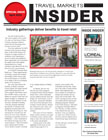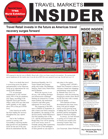 The duty free business in the Mercosur countries has continued to struggle in the first four months of this year, with expected improvements in Argentina and Brazil stalled, likely until the end of the year.
The duty free business in the Mercosur countries has continued to struggle in the first four months of this year, with expected improvements in Argentina and Brazil stalled, likely until the end of the year.
ASUTIL Secretary General José Luis Donagaray told media in a webinar this week that the industry does not expect to see improvements “until October at least.”
“The situation is very complicated,” Donagaray confirmed. In Argentina, despite expectations of deflation, inflation was up more than 11% in the first quarter, leading to widespread strikes and discontent as buying power erodes further. With elections scheduled for October, there is a chance that current President Mauricio Macri will lose and if former populist President Cristina Fernandez takes office again, business could fall even more.
In Brazil, new President Jair Bolsonaro is making some improvements in the economy, but the perception among many followers
is that not enough is being done to help them. The devaluation of currencies and the U.S. trade war with China further complicates the situation, he said.
As a result, duty free sales have slipped by 20-25% from January-April, reported Donagaray. Since the quarter is being compared to a relatively strong first quarter last year, ASUTIL “is waiting to see what will happen in May and June to have a more accurate comparison with last year. We will see the real downturn next quarter,” he warned.
“It’s been a very tough period for the industry in South America. Brazil is not developing as the big growth engine to push the business.”
Border stores
The opening of as many as nine duty free stores on the Brazilian side of the border in the next few months could offer some hope for the industry. Donagaray said that the first stores on the Brazilian border will open in Foz de Iguaçu, Uruguaiana, Santana do
Livramento and Jaguarão.
While more than half of the new shops—60%– will be run by local family-owned enterprises, Donagaray confirmed that major retailers Dufry, Duty Free Americas and Siñeriz are also planning to open stores. All of the potential operators have presented the legal documentation needed to obtain government approval.
The question of the Mercosur-wide harmonization resolution that was published in December and announced early this year is still under negotiation. The resolution called for the restriction of a wide range of products in border stores, some of which such as tobacco, electronics, ‘textiles’ and shoes are currently important product categories in stores. The vague wording of the restricted product list leaves room for many interpretations.
The resolution called for the Mercosur countries to “internalize” the list by April 1.
While only Brazil has done so, Argentina, Paraguay and Uruguay have continued to sell the products that they have traditionally sold in the duty free border stores, says Donagaray. “At the moment there are no changes,” he said. ASUTIL is continuing to meet regularly with the Brazilian authorities to discuss amending the list of restricted products. “We have a good dialogue with the government and I am optimistic that we will make progress. If stores that open on the Brazilian side of the border do not carry the same products as the stores on the other side of the border, the Brazilian stores will lose business,” he noted.
As the new border stores prepare to open, ASUTIL is organizing a 2-day “Frontera” meeting for the first week in November, in the city of Uruguaiana (to be confirmed). The format will feature presentations by the new operators and networking time to bring the participants together, said Donagaray. More details will be announced as they are confirmed.









